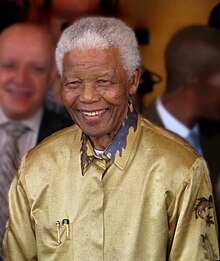Nelson Mandela
|
His Excellency Nelson Mandela |
|
|---|---|

Mandela in Johannesburg on 13 May 2008
|
|
| 1st President of South Africa | |
|
In office 10 May 1994 – 14 June 1999 |
|
| Deputy |
Thabo Mbeki F. W. de Klerk |
| Preceded by | F. W. de Klerk as State President |
| Succeeded by | Thabo Mbeki |
| Personal details | |
| Born |
Rolihlahla Mandela 18 July 1918 Mvezo, Cape Province, Union of South Africa |
| Died | 5 December 2013 (aged 95) Johannesburg, Gauteng, South Africa |
| Resting place | Mandela Graveyard Qunu, Eastern Cape |
| Political party | African National Congress |
| Other political affiliations |
South African Communist Party |
| Spouse(s) |
|
| Children | 6 (including Makgatho, Makaziwe, Zenani and Zindziswa) |
| Parents | Nosekeni Fanny Gadla Henry Mphakanyiswa |
| Alma mater | |
| Occupation |
|
| Religion | Methodist |
| Known for | Anti-Apartheid Movement |
| Awards |
|
| Notable work(s) | Long Walk to Freedom |
| Website | www |
| Nickname(s) |
|
Nelson Rolihlahla Mandela (/mænˈdɛlə/; 18 July 1918 – 5 December 2013) was a South African anti-apartheid revolutionary, politician, and philanthropist, who served as President of South Africa from 1994 to 1999. He was the country's first black head of state and the first elected in a fully representative democratic election. His government focused on dismantling the legacy of apartheid by tackling institutionalised racism and fostering racial reconciliation. Ideologically an African nationalist and socialist, he served as President of the African National Congress (ANC) party from 1991 to 1997.
A Xhosa, Mandela was born in Mvezo to the Thembu royal family. He studied law at the University of Fort Hare and the University of the Witwatersrand before working as a lawyer in Johannesburg. There he became involved in anti-colonial and African nationalist politics, joining the ANC in 1943 and co-founding its Youth League in 1944. After the National Party's white-only government established apartheid—a system of racial segregation that privileged whites—he and the ANC committed themselves to its overthrow. Mandela was appointed President of the ANC's Transvaal branch, rising to prominence for his involvement in the 1952 Defiance Campaign and the 1955 Congress of the People. He was repeatedly arrested for seditious activities and was unsuccessfully prosecuted in the 1956 Treason Trial. Influenced by Marxism, he secretly joined the South African Communist Party (SACP). Although initially committed to non-violent protest, in association with the SACP he co-founded the militant Umkhonto we Sizwe in 1961 and led a sabotage campaign against the government. In 1962, he was arrested for conspiring to overthrow the state and sentenced to life imprisonment in the Rivonia Trial.
...
Wikipedia
